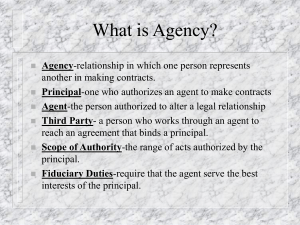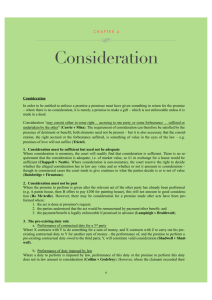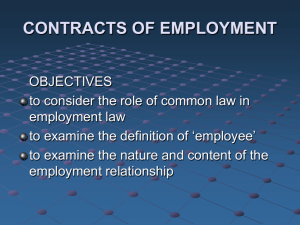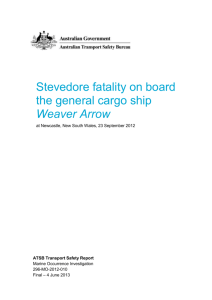Contract Law: Doctrine of Consideration Explained
advertisement
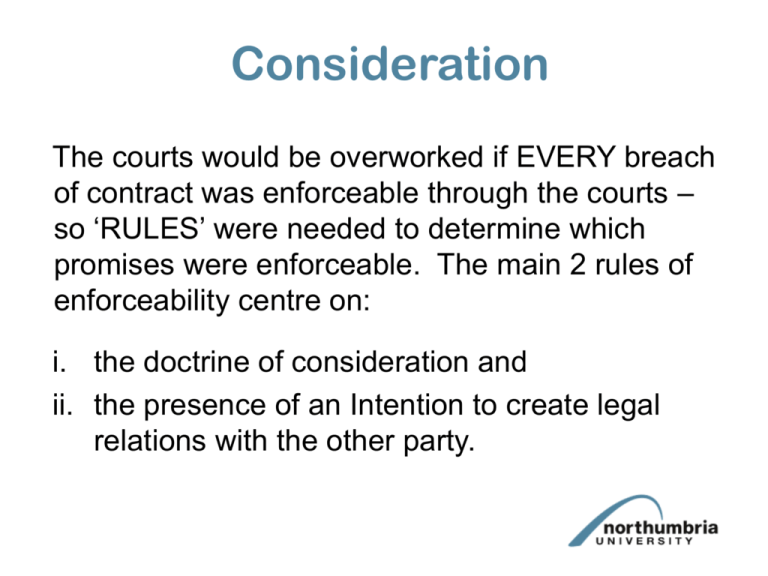
Consideration The courts would be overworked if EVERY breach of contract was enforceable through the courts – so ‘RULES’ were needed to determine which promises were enforceable. The main 2 rules of enforceability centre on: i. the doctrine of consideration and ii. the presence of an Intention to create legal relations with the other party. Approaches to Consideration Traditional view CURRIE v MISA 1875 – per Lush J who stated: ‘A valuable consideration, in the sense of law, may consist either in some right, interest, profit or benefit accruing to the one party, or some forbearance, detriment, loss or responsibility, given, suffered, or undertaken by the other’.. Approaches to Consideration The more modern view As stated by Sir Frederick Pollack in ‘Pollack’s Principles of contract’ – that consideration is ‘An act or forbearance of one party, or the promise thereof, being THE PRICE for which the promise of the other party is BOUGHT’. The ‘Sufficiency’ of consideration ‘What does it mean to say that consideration must be ‘sufficient’? Who decides whether or not the consideration is sufficient? … In answering these questions it is useful to distinguish the case where the alleged consideration takes the form of a promise to pay money for a service or product, from the case where the promise takes the form of a promise to provide some non-monetary benefit.’ Some key cases on the sufficiency of consideration THOMAS v THOMAS 1842 CHAPELL & Co Ltd v NESTLE CO LTD 1960 ALLIANCE BANK v BROOM 1864 Forbearance as consideration Intangible things like love and affection, morals and so forth, do not normally amount to consideration, but see: White v Bluett 1853 Pitt v PHH Asset Management Ltd 1994 Hamer v Sidway 1891 Sometimes the 19th century courts ‘ATTEMPTED TO SQUEEZE CASES INTO THE CATEGORY OF CONTRACT’ DE LA BERE v PEARSON 1908 The ‘doctrine of consideration’ has faults and some people have questioned its role in the modern law of contract. Past consideration ROSCORLA v THOMAS 1842 LAMPLEIGH v BRATHWAITE 1615 RE McARDLE 1951 PAO ON v LAU YIU LONG 1980 Can consideration be multiapplicable? We can look at this under the traditional 3 headings used in the text books – is there SUFFICIENT CONSIDERATION to make ANOTHER contract in the: i. performance of a PUBLIC or STATUTORY duty? ii. performance of a contractual duty ALREADY OWED to a 3rd party? iii. performance of an ALTERATION to an existing contractual duty? PERFORMANCE OF A PUBLIC/STATUTORY DUTY COLINS v GODEFROY 1831 GLASBROOK BROS LTD v GLAMORGAN COUNTY COUNCIL 1925 HARRIS v SHEFFIELD UTD FOOTBALL CLUB LTD 1987 Police Act 1964, section 15 (1) PERFORMANCE OF A STATUTORY DUTY WARD v BYHAM 1956 In the Court of Appeal it was held by the majority that although the mother was under a STATUTORY DUTY TO LOOK AFTER THE CHILD, because she had parental responsibility for the child, she HAD provided EXTRA CONSIDERATION for the £1 a week from the father by promising to keep the child happy and by allowing her the choice of where to live. PERFORMANCE OF CONTRACTUAL DUTY ‘ALREADY’ OWED TO A THIRD PARTY In these situations the general rule is AVOIDED so that performance of a duty to a third party can be consideration for a NEW PROMISE. SCOTSON v PEGG 1861 NEW ZEALAND SHIPPING CO LTD v SATTERTHWAITE – THE EURYMEDON 1975 The Eurymedon 1975 The Privy Council (per Lord Wilberforce who delivered the opinion of the majority) held that the relationship between the shippers and the stevedores could be put to contractual analysis by regarding the bill of lading as a UNILATERAL OFFER that was accepted by the stevedores when they PERFORMED THE ACT of unloading the drill. The CONSIDERATION by the stevedores in this contract was the unloading of the drill and it MADE NO DIFFERENCE that the stevedores WERE ALREADY CONTRACTED TO UNLOAD THE DRILL BY THE CARRIER.

